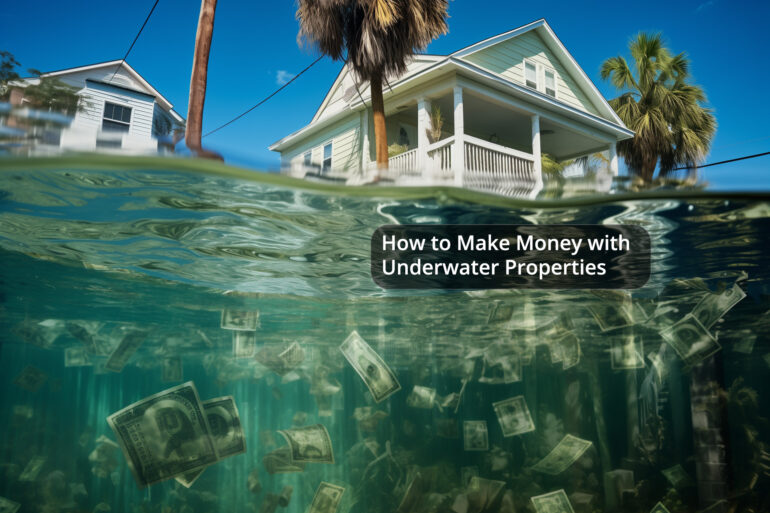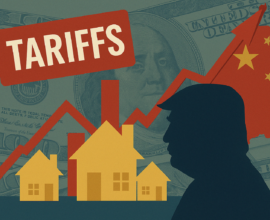How to Make Money with Underwater Properties
Real estate, in many ways, mirrors the vastness of the ocean. While some parts are calm and serene, others hide unpredictable currents and submerged treasures waiting to be discovered. Among these submerged treasures is the niche of underwater properties: a segment that, while daunting, holds immense promise for those willing to dive to the greatest depths.
What Exactly is an Underwater Property?
At its core, an underwater property is a home where the outstanding balance on the mortgage is more than the current market value. That means the homeowner owes more than the home’s worth. Such situations can arise for many reasons: economic downturns, a sudden flood in the housing market, or natural disasters that send property values to the ocean floor.
For homeowners, it’s like being caught in a riptide. Selling or refinancing becomes an intricate dance, and drawing from their home equity feels impossible. Worse yet, there’s always the looming shadow of foreclosure if those mortgage payments aren’t met. This opportunity is golden for investors with a keen eye and a penchant for risk: a chance to buy low, add value, and potentially sell high.
The reality is that there are still plenty of underwater mortgages out there for savvy investors.
Are Underwater Properties Good for Investors?
Real estate investors looking to expand their portfolios often succeed with underwater properties when the owner owes more to the property than the current market value. Of course, there are both pros and cons to investing in underwater properties:
Potential Advantages:
- Discounted prices: Homeowners motivated to avoid foreclosure may accept below-market prices, allowing investors to acquire properties at a discount.
- Short sales: Lenders may approve short sales to unload underwater mortgages, leading to discounted purchase prices.
- High returns: Large profits are possible if acquired at a low cost and sold when values recover.
- Lender motivation: Lenders want to avoid costly foreclosures, possibly improving purchase terms.
- Future appreciation: Low purchase prices now could yield significant gains if markets rebound.
Potential Risks and Challenges:
- Negotiation difficulties: Complex talks with lenders for short sales or discounted purchases can be challenging and uncertain.
- Market declines: Properties may stay underwater if values continue falling.
- Hidden liabilities: Second mortgages or liens could complicate transactions.
- Homeowner resistance: Emotional attachment may make sellers reluctant or uncooperative.
- Maintenance costs: Owners may defer upkeep on underwater homes, requiring repair investments.
Underwater properties present an opportunity for large returns through discounted buying but also carry risks from market uncertainty, complex negotiations, and potential hidden costs. Investors must weigh these carefully when pursuing underwater deals.
With unemployment skyrocketing and financial security becoming a mirage for many, mortgage payments were missed, and many homes slipped underwater.
Unfortunately, investors looking for underwater properties may not be as plentiful as they once were. According to the Q2 2023 U.S. Home Equity & Underwater Report by ATTOM Data Solutions, nearly half (49%) of mortgage homes in the U.S. are cruising into equity. This number rose from previous quarters, showing a positive trend.
The same report showed that just under 3% of homes felt the pressure and were considered seriously underwater. While this seems like a small percentage, the actual number translates to thousands of homeowners and properties.
Interestingly, only around 235,500 homeowners were on the edge of foreclosure, and 92% still held some home equity. Historically, most foreclosures happen because homeowners own more than their homes are worth. If homes facing foreclosure have positive equity, as the data shows, it points to other economic factors leading to foreclosure: job loss, increased cost of living, or other financial hardships, as opposed to declining home values.
The reality is that there are still plenty of underwater mortgages out there for savvy investors. According to the ATTOM report, here are the top ten states with underwater properties in foreclosure in Q2 2023:
- Mississippi (~12%)
- District of Columbia (~11%)
- Louisiana (~10%)
- West Virginia (~9.5%)
- Illinois (~7%)
- Maryland (~6%)
- North Dakota (~6%)
- Missouri (~5.8%)
- Indiana (~5.7%)
- Kansas (~5.6%)
While the profit potential is significant, ensuring the numbers stack up in your favor is crucial.
The Pandemic’s Wave: COVID-19 and its Impact
Few events have shaken the global landscape like the COVID-19 pandemic, and its ripples were felt strongly in the housing market. With unemployment skyrocketing and financial security becoming a mirage for many, mortgage payments were missed, and many homes slipped underwater.
The pandemic’s effects weren’t just economic. With lockdowns in place and health concerns paramount, the housing market saw reduced activity. Fewer people were buying; fewer were selling. This slowdown affected property values, especially in areas reliant on industries like tourism and hospitality.
ATTOM Data Solutions highlighted a significant surge in underwater homes during the pandemic: a whopping 1.6 million increase in just a year. While troubling for homeowners, this shift opened a sea of opportunities for investors.
Financing Underwater Properties: The Money Matters
Diving into the world of underwater properties means navigating the intricate waters of financing. While the profit potential is significant, ensuring the numbers stack up in your favor is crucial. Here’s a more detailed exploration of the financial considerations:
Interest Rates: Acquiring an underwater property might mean grappling with higher interest rates. Since these properties are perceived as riskier, lenders often charge more to offset their potential losses. However, this doesn’t mean you can’t negotiate. Shop around, compare rates from different lenders, and consider leveraging a good credit score or a substantial down payment to secure a better deal.
Down Payments: A larger down payment can demonstrate your commitment and reduce the lender’s risk. While paying as much upfront as possible is tempting, remember to keep enough liquidity for renovations, potential market downturns, or other unexpected expenses.
Loan-to-Value (LTV) Ratio: LTV ratios can be critical to securing financing. Lenders often become wary when the LTV ratio is high, signaling that the loan amount is significantly higher than the property’s current value. If you’re considering an underwater property, aim for a balanced LTV ratio that appeases lenders without overextending yourself.
Alternative Financing Options: Traditional bank loans might not always be the best or most accessible route. Consider exploring hard money loans, asset-based loans with higher interest rates but faster approval processes. Partnering with other investors or pooling resources from investment groups can also offer the financial boost you need.
Terms of Financing: When dealing with underwater properties, the loan duration, payment terms, and potential penalties become even more critical. Opt for flexible terms, especially if considering renovating and flipping the property.
Refinancing Opportunities: Keep an eye on market trends and interest rates. If the property’s value starts to appreciate or market rates dip, there might be an opportunity to refinance the property at more favorable terms.
Insurance Considerations: Given that underwater properties might be considered higher risk, insurance premiums could be steeper. Ensure you factor in these costs and shop around for the best insurance deals.
The underwater property niche, while intricate, is laden with opportunities for those with vision, patience, and the right strategy.
Tips to Ride the Underwater Wave
For investors eyeing the underwater property segment, here are some strategies to ride the wave successfully:
Deep Dive into Due Diligence: Gather as much information as possible before taking the plunge. Every detail counts, from the property’s actual worth to its potential appreciation. Dive into neighborhood trends, local amenities, future infrastructure projects, and even school ratings. The more you know, the better your investment decision.
Masterful Negotiations: This is where your interpersonal skills shine. Engage in transparent and mutually beneficial discussions with lenders and homeowners. Understand their needs and constraints. Being empathetic and solution-oriented can lead to win-win scenarios.
Crafting an Exit Strategy: Investing without an exit plan is like diving without an oxygen tank. Whether you plan to flip, rent, or refinance, have a clear strategy in place.
Assemble Your Dive Team: Real estate isn’t just about properties but people. Surrounding yourself with a knowledgeable team can make the difference between a successful dive and getting caught in an underwater trap.
Diving Deep to Surface Stronger
The vast ocean of real estate, with its calm surfaces and hidden depths, offers challenges and treasures. The underwater property niche, while intricate, is laden with opportunities for those with vision, patience, and the right strategy. As the housing market landscape evolves, especially in the aftermath of unforeseen global events like the COVID-19 pandemic, the value of understanding this segment becomes even more paramount.
For investors, it’s not just about acquiring a property; it’s about navigating the currents, understanding the ecosystem, and recognizing the potential beneath the surface. As we look ahead, the importance of due diligence, negotiation skills, and a robust support system cannot be overstated. In this ever-changing market, those equipped with knowledge and adaptability will not only survive but thrive, turning submerged challenges into unparalleled opportunities. Dive in, and may your investments always find their way to the surface, gleaming with promise and profit.








